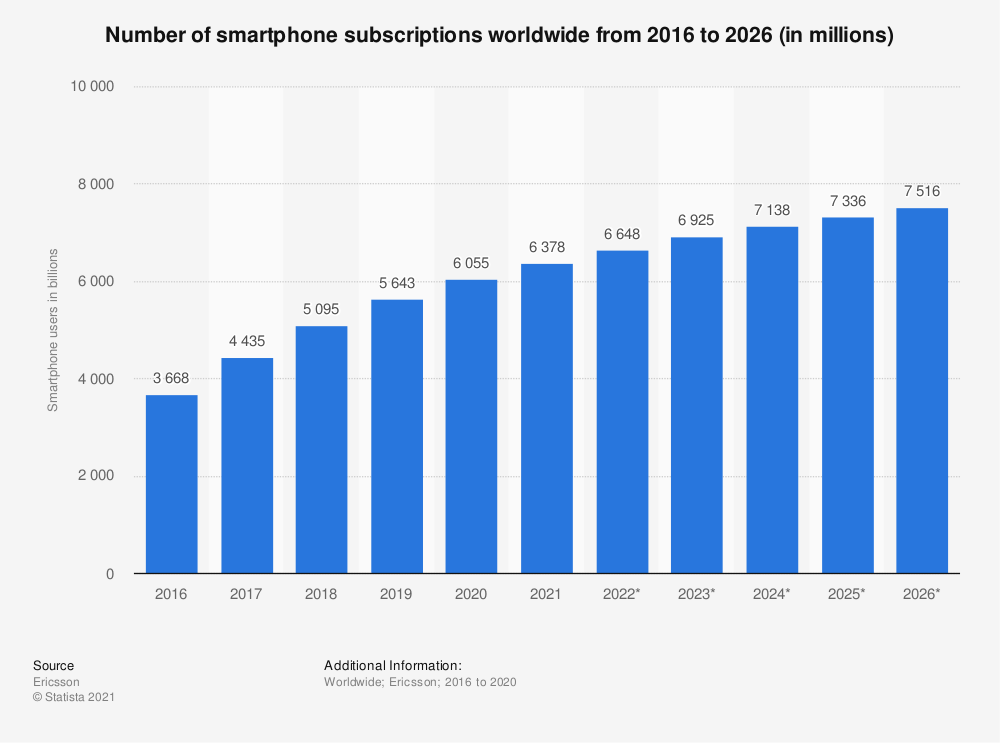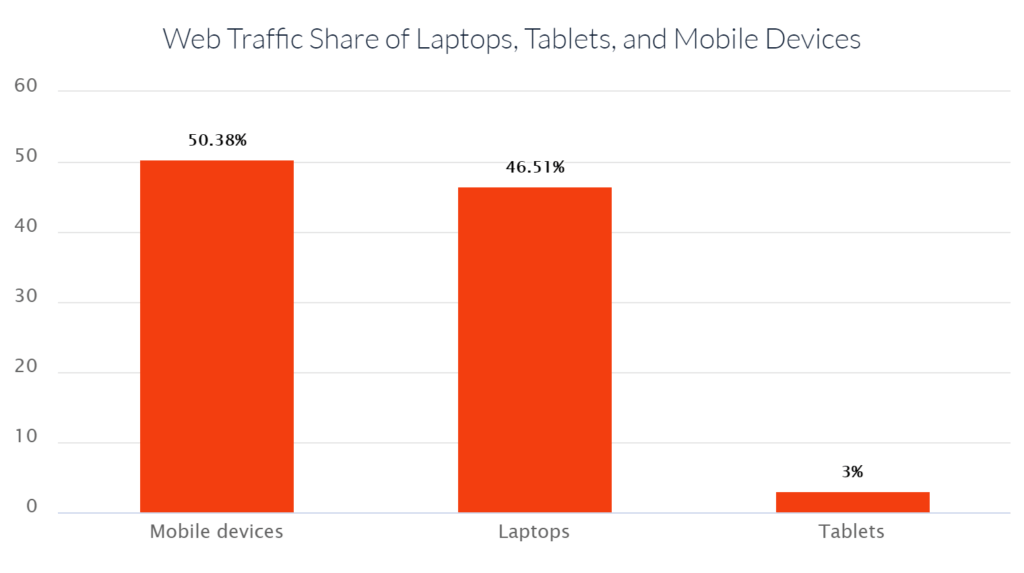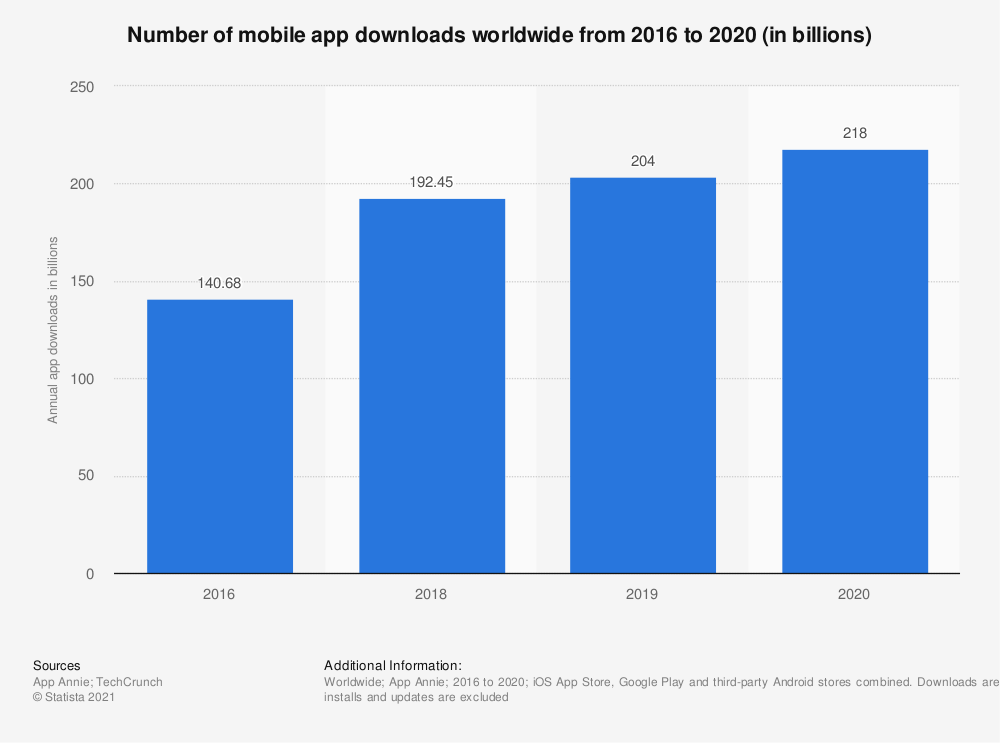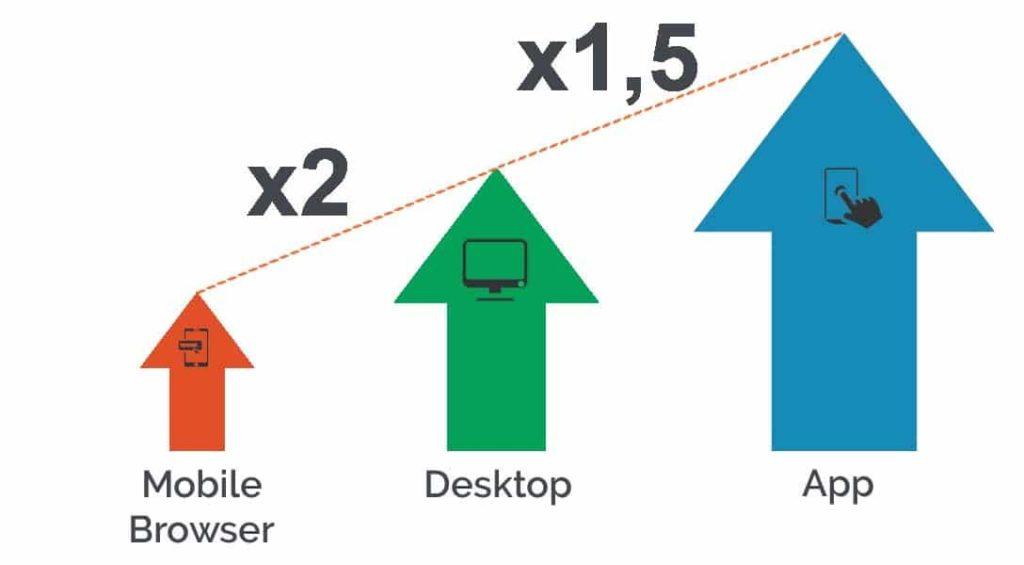Month: August 2022
Web vs Mobile App: Which to Choose for Your Business in 2023
In 2021, there were 6.3 billion smartphone subscriptions in the world according to Statista. In 2019, 67% of the human population had a smartphone. This is an enormous market, and businesses are trying to figure out the best way to win the audience of active mobile users that do everything with the help of their smartphones.

The usage of smartphones is growing worldwide each year
Trendsetters like Google encourage businesses to become more mobile-friendly. While businesses don’t necessarily have to build mobile apps, their websites should be user-friendly if they want to appear near the top of Google’s rankings.
Today, a greater share of web traffic is attributed to mobile devices than laptops according to Guide2Research:

In this article, I’ll compare mobile websites to mobile applications. Even if your main focus is a desktop website, you’ll still need to adapt it for mobile devices so it can be discovered and used.
I’ll also tell you about your options since there are plenty: You can create a mobile website, wrap your website into a mobile app, build a simple cross-platform app, or choose native technologies for app development.
Businesses commonly start with a desktop website, then adapt it for mobile and later develop a mobile application. However, maybe your business will benefit more from developing an app first. Let’s discuss all the options and then figure out what businesses benefit from them the most.
Mobile websites
A mobile website is a browser-based software that allows users to access your content through their mobile devices. Mobile websites use the same technologies as desktop websites: HTML, CSS, and JavaScript for the front end along with backend languages for the business logic.
It’s common practice to make websites not only mobile-friendly but also responsive so they look great on all kinds of screens and devices, from desktop computers to tablets and mobile phones. A responsive website detects what screen it’s currently on and scales all UI elements accordingly.
Websites are great to test the waters, take the first step towards a digital presence and see if there’s demand for your services
Mobile websites are relatively easy to create, and it’s often cheaper to create a mobile website than to build a mobile application, which is why many businesses choose mobile websites for their marketing campaigns, public relations, promotions, and outreach. Mobile websites are also easier to maintain, and you won’t have to worry about compatibility issues.
Websites are great to test the waters, take the first step towards a digital presence, and see if there’s demand for your services. However, not every service will be successful as a mobile website. Sometimes it makes more sense to invest in creating a mobile application.
Pros and cons of mobile websites
Pros:
- Cheaper than developing an app
- Universal and will run on any device
- Ranked higher than non-mobile-friendly websites in search results
- Broader reach: the website audience is still larger than the mobile app audience
- Easy to maintain and support
Cons:
- Poor UI/UX
- No device-specific capabilities like push notifications, geolocation, access to camera or microphone
- No offline functionality
- Less content to be displayed
Mobile apps
Mobile applications are pieces of software installed on mobile devices. Broadly speaking, there are three types of mobile apps that can be built on numerous technologies:
- Native apps are built with native technologies like Kotlin and Java for Android and Swift and Objective-C for iOS. A native application only works with the platform it was designed for, so if you want your app to be present on both Android and iOS, you’ll need to develop two separate apps.
- Cross-platform apps work on both Android and iOS. The most popular cross-platform technologies are React Native and Flutter. Cross-platform apps sometimes have functional limitations compared to native apps.
- Hybrid apps are websites wrapped in a mobile interface. They have issues with compatibility and access to mobile-specific features. Cordova, Ionic, and Xamarin are some of the most popular hybrid app frameworks.
Mobile applications are created specifically for smartphones, so they look and feel natural to the user, making the user experience much better than that provided by a mobile website.
Why use an app instead of a website? The main advantage for users is the ability to use all device capabilities, including:
- Camera
- Microphone
- Accelerometer
- GPS
- Push notifications
- Augmented reality
- In-app calls
- Instant payments
- NFC
- Bluetooth
Why are apps better than websites in terms of functionality? Mobile apps have endless possibilities in terms of functionality, especially if built with native technologies or high-quality cross-platform frameworks like Flutter and React Native.
Also, mobile applications are easy to navigate because they’re standardized according to Material Design from Google and the Human Interface Guidelines from Apple. This means that your app will have a native feel that makes the user experience intuitive and simple.
Mobile applications provide fast access to content that’s organized in a way that’s convenient for users to consume and navigate, which is why mobile apps are the best solution for gaining a mobile audience.
Unlike websites, which are discovered through search engines, apps are discovered on app markets like the Google Play Store and the App Store. These markets have their own search functionality that you can optimize your app for.
Let’s sum up the pros and cons of mobile apps.
Pros:
- Access to a mobile audience
- No limits in terms of functionality
- Can use all mobile device capabilities
- UX is much better than with mobile websites
- Can communicate with your users directly through push notifications
- Often have better analytics and offer more personalization
- More offline possibilities
- Can be a serious advantage over your competitors
- More secure than mobile websites
Cons:
- More expensive than a website to develop and support
- Require heavier marketing
- Need to invest more into design and the user experience
Now that I’ve given you a clearer understanding of what mobile apps and websites are and what the most prominent differences are between them, let’s compare mobile vs web software according to certain criteria.
Mobile websites vs mobile apps: side-by-side comparison
What to develop, mobile apps or web apps? Let’s explore the main differences and what lies behind each.
Number of users
Across the board, websites can claim more users than mobile apps. And though mobile apps account for 90% of the time spent on mobile devices, the mobile vs desktop debate doesn’t have a clear winner. If you develop a website adapted for mobile browsers, you’ll get access to a larger audience than you would with a mobile app.

The number of app downloads, however, continues to grow, especially since the start of the COVID-19 pandemic.
Discoverability and accessibility
The difference between website and application when it comes to discovery is huge. Because mobile apps are platform-specific and are downloaded to mobile devices, users can’t just access a mobile app with one click: they need to download it first. This means you can get users only if they make an effort to download and open your app.
According to Statista, 25% of users uninstall an app after only one use, and many users uninstall apps without ever launching them. This gives businesses an additional challenge of encouraging users to try out their apps and actually stay.
Websites are easier to access than mobile applications because users just need to click a link once without installing anything on their devices. This makes mobile websites more accessible.
As I already mentioned, apps have a different discovery mechanism. You’ll need app store optimization (ASO) to help potential users discover your app on the App Store and Google Play Store. You’ll also need other tools like advertising, social media marketing, and email marketing to encourage people to install your app.
Engagement
High engagement is one of the benefits of a mobile app over a website. With the help of push notifications, you can remind users to visit your app. Other capabilities like gamification, augmented reality, and QR code scanners can link your offline business with your online business and make users more engaged with your brand.
It’s fair to say that the majority of smartphone screen time is spent on social media, but business apps also get their fair share of attention. According to Jmango, app users spend an average 201.8 minutes per month shopping, compared to 10.9 minutes per month for website users.
Personalization
When it comes to personalization, mobile apps definitely beat mobile websites. Mobile applications often have more advanced analytics, and you can not only figure out the demographics of your users but also track their actions and behavior so you can avoid bottlenecks and increase conversions.
Push notifications, which are the best means of communicating with your customers, can also be highly personalized. For example, if you notice that a group of users is particularly interested in one of your products, you can send them a notification with a special offer.
At Mobindustry, we have implemented location-based push notifications that notify users of special offers in physical stores when users are near them. Naturally, these notifications increase the conversion rate.
Conversion rate
Despite the demands of both customers and search engines to adapt websites for mobile, mobile websites have lower conversion rates compared to desktop websites and mobile apps.

Mobile browsers are often too inconvenient for shopping or picking products, so most people use mobile apps to search for products and then purchase them either directly in the app or from a desktop website.
The mobile app user experience can make the user journey not only convenient but also fun, and conversion rates are usually higher in mobile apps because of higher engagement levels.
Speed, performance, and functionality
Speed is one of the biggest advantages of an app over a website. Mobile apps load faster than mobile websites and have overall better performance due to different loading logic. As I already mentioned, the functionality in mobile apps is almost limitless, and the limits that do exist are only defined by the technologies you use.
For example, in native apps, you can incorporate anything from AR to machine learning to provide top-notch service.
Design and branding
Though mobile apps have certain platform-specific restrictions and design requirements, they still offer more possibilities when it comes to design. You can make your mobile app unforgettable with its UI so that customers will recognize your brand and remember it each time they launch your app on their mobile device.
You can surely design a good mobile website too, but you’ll always have typical browser navigation that harms the user experience. Also, because mobile websites load slower than mobile apps, you’ll need to make your design lightweight to avoid seeing a significant decrease in traffic.
Offline functionality
If offline functionality is important for you, a mobile app is a clear winner. Of course, apps need an internet connection for most of their functionality. However, they still can offer much of their content and basic functionality while offline.
For example, in a banking app, features like tax or mortgage calculations can work offline.
Some websites also cache data so they can load pages offline, but their functionality is limited.
Data reporting and analytics
If you want to get more insights into your customers’ behavior, you should definitely look at apps. Reporting in apps allows you to get valuable data on everything from your software performance to user behavior, the most used devices, and demographics.
Also, if you need to show your users data reports — for example, if you want to build a platform for investing or social media — a mobile app interface will be much more convenient than a mobile website for showing all the charts and graphs.
Cost of development
The difference between web development and mobile app development is drastic. Mobile apps are generally more expensive to develop than websites. The cost of development depends on lots of factors, including:
- Functionality
- Tech stack
- Design complexity
- Your development team’s hourly rates
- Cost of third-party services
- Integrations
- Platforms you want your app to be available on
While you can create a website for $1,000 to $5,000, a mobile app usually requires at least $10,000 for development.
What should you develop first?
At this point, you’re probably already leaning towards either a mobile-friendly website or a mobile app. Let’s sum up when you should choose a mobile website and when you should choose a mobile app so it’s easy for you to make your decision.
Choose a mobile website if:
- You have a limited budget. Developing a website is cheaper than creating a mobile app, and you can save even more money by using frameworks like WordPress that have templates.
- You plan to use your software for promoting your business. If you don’t plan to create a fully fledged platform that your customers will use several times a day, you can build a website first.
- You want to reach as many people as possible. Websites still have a larger audience than mobile apps, and it’s easier to attract people to your website than to your app.
Choose a mobile app if:
- You need mobile-specific features like cameras or geolocation to deliver your service. For example, Uber could never exist as a website because geolocation is at the core of the service.
- Your users will need offline functionality. If users might need your product while they’re in places with no internet connection, only a mobile app will fit the bill.
- Your customers need your service several times a day. If your service is used constantly, a mobile app is the clear answer, as it’s just more convenient and faster to use a web app. Social media, calendar, email, fitness, and reminder services are all better as apps.
- You need to show stats to your customers. For example, if you have a banking platform and want to show spending statistics, it will be more convenient for users to look at them in an application
- You have a sufficient budget of at least $10,000. This is the starting point for most mobile apps. To save money, you can outsource development to a good company abroad and develop a high-quality cross-platform app for both Android and iOS using Flutter or React Native
- Your competitors have apps. An application is a serious business advantage, and if your competitors already offer mobile apps as part of their service, it’s a valid reason to build your own app. However, if your competitors don’t have apps yet, it may be a good idea to be the first.
- You want to create an additional revenue stream. Mobile applications not only give you access to a new audience with its spending habits but to lots of opportunities to sell more. You can monetize your app in various ways and create an additional source of revenue for your business. For example, if you’re a gym and you make money on memberships, you can also record your classes and sell them online to a large audience that prefers home workouts.
As you can see, the choice between website and mobile app can be rather difficult.
If you’re still asking yourself “Should I make a website or an app?”, contact us. We provide consultations with mobile and web experts who can help you make the best decisions concerning your software’s target platform, functionality, technology stack, and cost.

